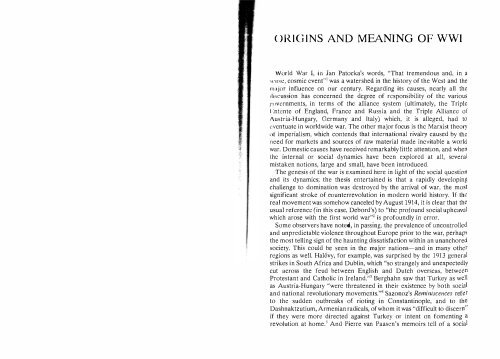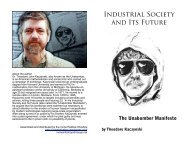CONTENTS - ouroboros ponderosa
CONTENTS - ouroboros ponderosa
CONTENTS - ouroboros ponderosa
Create successful ePaper yourself
Turn your PDF publications into a flip-book with our unique Google optimized e-Paper software.
-<br />
..<br />
ORIGINS AND MEANING OF WWI<br />
World War T, in Jan Patocka's words, "That tremendous and, in a<br />
"'nsc, cosmic cvent'" was a watershed in the history of the West and the<br />
II,ajor influence on our century. Regarding its causes, nearly all the<br />
discussion has concerned the dcgree of responsibility of the various<br />
I',,,vcrnments, in terms of the alliance system (ultimately, the Triple<br />
":ntente of England, France and Russia and the Triple Alliance of<br />
Austria-Hungary, Germany and Italy) which, it is alleged, had to<br />
eventuate in worldwide war. The other major focus is thc Marxist theory<br />
of imperialism, which contends that international rivalry caused by the<br />
need for markets and sourccs of raw material made inevitable a world<br />
war. Domestic causcs have received remarkably little attention, and when<br />
the internal or social dynamics have been explorcd at all, several<br />
mistaken notions, large and small, have been introduced,<br />
The genesis of the war is examined here in light of the social question<br />
and its dynamics; the thesis entertained is that a rapidly developing<br />
challenge to domination was destroyed by the arrival of war, the most<br />
significant stroke of counterrevolution in modern world history. If the<br />
real movement was somehow canceled by August 1914, it is clear that the<br />
usual reference (in this case, Debord's) to "the profound social upheaval<br />
which arose with the first world war'" is profoundly in error.<br />
Some obselvers have noted, in passing, the prevalence of uncontrolled<br />
and unpredictable violence throughout Europe prior to the war, perhaps<br />
the most telling sign of the haunting dissatisfaction within an unanchored<br />
society. This could be seen in the major nations-and in many other<br />
regions as well. Ha\(!vy, for example, was surprised by the 1913 general<br />
strikes in South Africa and Dublin, which "so strangely and unexpectedly<br />
cut across the feud between English and Dutch overseas, betwcen<br />
Protestant and Catholic in Ireland." ] Berghahn saw that Turkey as well<br />
as Austria-Hungary "were threatened in their existence by both social<br />
and national revolutionary movements.'" Sazonoz's Reminiscences refer<br />
to the sudden outbreaks of rioting in Constantinople, and to the<br />
Dashnaktzutium, Armenian radicals, of whom it was "difficult to discern "<br />
if they were more directed against Turkey or intent on fomenting a<br />
revolution at home. ' And Pierre van Paascn's memoirs tcll of a social






